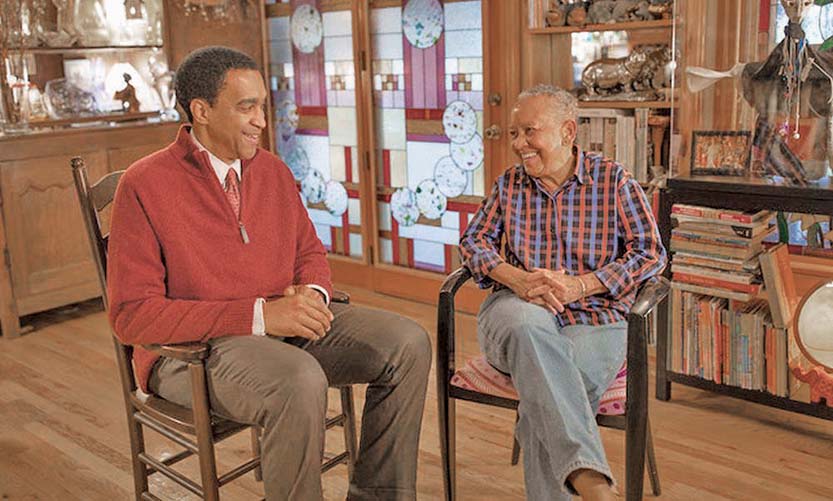
Why would one of poetry’s most revered voices want to curate a jazz saxophonist’s album of gospel hymns and spirituals? “These songs are so important,” says Nikki Giovanni, one of Oprah Winfrey’s 25 “Living Legends” and a Maya Angelou Lifetime Achievement Award winner for 2017. “They comforted people through times of slavery, and during recent years we needed them to comfort us again. But a lot of the students today do not know about the history of these songs, and they should. So I’m out here putting water on the flowers because they need a drink.”
Giovanni’s historic collaboration with saxophonist-composer and former Jazz Messenger Javon Jackson has yielded The Gospel According to Nikki Giovanni on his Solid Jackson label. “The spirituals have been around so long,” says the renowned poet, activist, and educator, who came to prominence in the 1960s and ’70s as a foundational member of the Black Arts movement following the publication of such early works as 1968’s book of poetry Black Feeling, Black Talk/Black Judgment and 1970s ReCreation.
Jackson brings his bold-toned, Coltrane-inspired tenor lines to bear on a series of hymns, spirituals, and gospel numbers hand-picked by Giovan- ni, who was also the first person to receive the Rosa L. Parks Women of Courage Award. And the 78-year-old poet makes a rare vocal appearance on the tender ballad “Night Song,” singing a song identified with her close friend, the late civil rights activist and High Priestess of Soul, Nina Simone. “Nina was a friend of mine, and I knew that one of her favorite songs was ‘Night Song’,” she explains. “And even though I’m not a singer, I told Javon I wanted to sing it because I just wanted Nina to be remembered.” Jackson flew to Nikki’s home in Roanoke to put her vocals to the instrumental tracks.
Joined by an outstanding crew comprised of pianist Jeremy Manasia, bassist David Williams and drummer McClenty Hunter, Jackson interprets gospel staples like “Swing Low, Sweet Chariot,” “Wade in the Water,” “Didn’t My Lord Deliver Daniel” and “Leaning on the Everlasting Arms” with authoritative tenor tones, deep walking bass lines and an organic sense of group swing.
The Gospel According to Nikki Giovanni came about through a serendipitous meeting between the two principals when Jackson, a faculty member of The Hartt School at the University of Hartford and director of its Jackie McLean Institute of Jazz, invited Giovanni to speak to his students there. As he recalls, “Ever since I’ve been at the University of Hartford, I felt that the school would be well-served to bring great scholars of color and scholars who were freedom fighters and activists, if you will. So I brought in Dr. Cornel West, Sonia Sanchez, Angela Davis, and Michael Eric Dyson. Then in February of 2020, I brought Nikki Giovanni.”
The renowned poet’s appearance at the University coincided with her receiving an honorary doctorate there. And as Jackson recalls, “After Nikki spoke to the students, she noticed that the Hank Jones and Charlie Haden CD of hymns and spirituals (1994’s Steal Away) were playing in the auditorium. She said she loved it and wanted to hear more, and just then I was hit with the idea.” Two days later, after she returned to her home in Roanoke, Jackson contacted her and asked if she would pick 10 hymns and she agreed.

The most intimate piece of the collection is the gentle hymn “Lord, I Want to Be a Christian,” performed as a rubato duet between Jackson’s tenor sax and Manasia’s piano. The quartet closes on a rousing note with a swinging “I Opened My Mouth to the Lord,” which again features Williams’ deeply resonant bass carrying the melody and Jackson in strong ‘speechifying’ mode on tenor sax. Manasia also turns in an exhilarating piano solo here, and even drummer Hunter gets a solo taste near the end of this triumphant closer.
Captured live at Telefunken Studios in South Windsor, Connecticut, the 10 tunes on The Gospel According to Nikki Giovanni were all recorded without the use of headphones, another first for Jackson. “I’ve never done a recording before in a studio where I didn’t use headphones, so it felt like performing a gig,” he says. “We never counted off a piece and there were no endings, where I might dictate or give a direction towards an ending. I really wanted to do it just like if you’re in church, where there’s a preacher talking, and all of a sudden the choir begins. So each time, whether the bass would start the tune or the piano or myself, there were no count-offs because I wanted to make it as natural as possible.”
“This music is something that people will probably be a little surprised to see coming from me,” Jackson says. But given the state of the world, it could be just in time. Both poets and saxophonists stand on the shoulders of their ancestors in The Gospel According to Nikki Giovanni.





